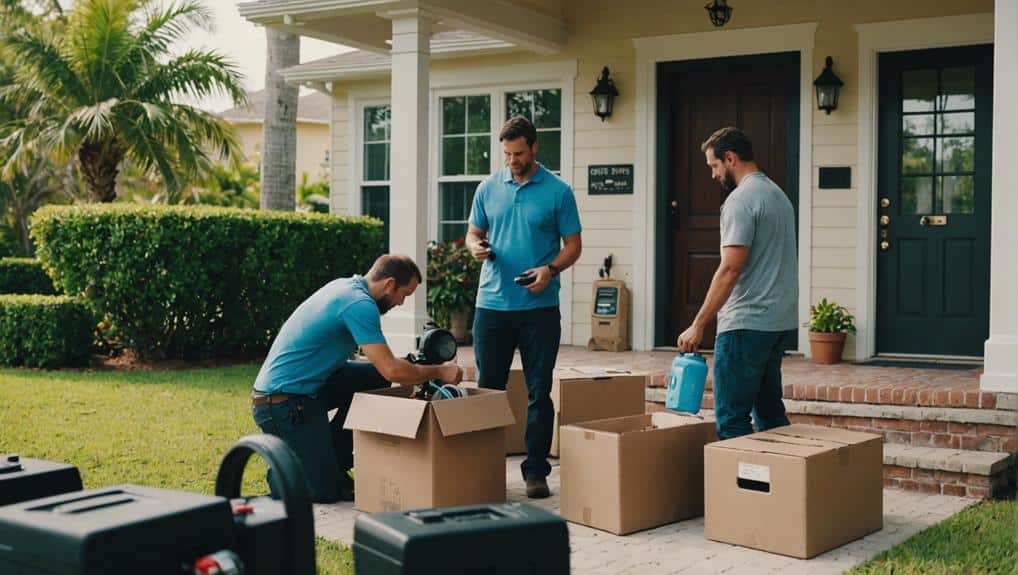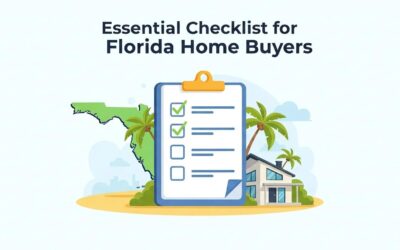Ready for your Florida relocation? Start by obtaining your Florida driver’s license and registering your vehicle promptly.Establish your residency and update your voter registration. Take advantage of tax benefits like the Homestead Exemption and Florida’s lack of state income tax. Look into housing trends and utility costs to budget effectively. Prepare for hurricane season and enjoy the state’s variety of outdoor activities. Research neighborhoods, employment opportunities, and schools if you have children. Don’t forget to set up utilities and integrate into the community through local events and organizations. Stay tuned for more on making your move a success.
Key Takeaways
- Obtain a Florida driver’s license and register your vehicle within the required timeframes.
- Update your voter registration and apply for a Homestead Exemption.
- Research housing options, median home prices, and cost of living in various regions.
- Contact local utility providers to install electric, water, gas, internet, and cable services.
- Integrate into the community by attending local events and joining clubs or organizations.
Essential Points to RememberEstablish Residency
To establish residency in Florida, begin by obtaining a Florida driver’s license and registering your vehicle in the state. This essential step ties you to the local community and indicates your intention to make Florida your home. Next, update your voter registration to Florida. This gives you the right to vote in local and state elections and demonstrates your commitment to becoming a Floridian.
Applying for a Homestead Exemption is another critical move. This exemption on your primary residence can reduce your property taxes, enhancing your financial benefits. You should also live in Florida for at least six months out of the year to solidify your residency status.
Many are drawn to Florida for its lack of income tax, which can significantly impact financial planning. Establishing residency can also provide access to in-state tuition rates at Florida’s colleges and universities, a substantial benefit if you or your family are pursuing higher education.
Understand Tax Exemptions
Understanding Florida’s tax exemptions can significantly reduce your financial burden. Take advantage of the Homestead Exemption, which offers up to $50,000 in property tax relief for eligible residents. Moreover, Florida’s lack of state income and inheritance tax can lead to substantial savings.
Homestead Exemption Benefits
Florida’s homestead exemption can significantly lower your property tax bill by decreasing the assessed value of your primary residence by up to $50,000. You can tap into substantial savings if you’re a permanent resident and your home is your primary residence. The homestead exemption reduces your property’s assessed value and includes a 3% annual cap on property tax increases, guaranteeing your tax benefits grow over time.
To maximize your savings, it’s crucial to understand the process and make sure you qualify. Start by confirming your permanent residency status and primary residence designation. Once verified, apply for the homestead exemption to enjoy lower property taxes and the additional benefits of the 3% annual cap.
Here’s a snapshot of the key benefits:
| Benefit | Description | Financial Impact |
|---|---|---|
| Homestead Exemption | Reduces assessed value by up to $50,000 | Lower property tax bill |
| Permanent Residency Required | Must be a permanent resident of Florida | Eligibility for exemptions |
| 3% Annual Cap | Limits annual property tax increase to 3% | Long-term savings |
Tax Savings Opportunities
As you establish yourself in your new Florida residence, exploring the array of tax exemptions available to maximize your savings is essential. Florida provides substantial property tax exemptions, offering up to $50,000 for eligible homeowners. This exemption can significantly reduce your annual property tax bill, saving considerable costs.
Beyond property tax exemptions, the Florida Save Our Homes Act caps annual property value increases, ensuring your property taxes remain predictable and manageable. This act can provide significant long-term financial relief as property values rise.
Florida’s tax landscape is further appealing due to the absence of an inheritance tax on inherited properties. This means you won’t face additional tax burdens when inheriting a home, preserving your wealth for future generations.
Moreover, Florida’s lack of state income tax offers immediate financial relief, allowing you to retain more earnings. Understanding tax exemptions in Florida can significantly enhance your financial well-being.
Licensing and Vehicle Registration

When you relocate to Florida, you’ll need to swiftly handle the essential tasks of exchanging your out-of-state driver’s license and registering your vehicle to comply with state regulations. First, obtain your Florida driver’s license within 30 days of establishing residency. Visit the Florida Department of Highway Safety and Motor Vehicles (FLHSMV) office with your out-of-state license, proof of identity, Social Security Number, and residential address. You will also need to pass a vision test.
Next, register your vehicle within ten days. Ensure you have proof of identity, Florida motor insurance, and an authentic vehicle title. This will help you avoid legal issues and make you feel like a true Floridian.
Here’s a quick reference table to keep you on track:
| Task | Requirements |
|---|---|
| Florida Driver’s License | Out-of-state license, proof of identity, Social Security Number, residential address, vision test |
| Vehicle Registration | Proof of identity, Florida motor insurance, authentic vehicle title |
| Timeline | Driver’s license: 30 days, Vehicle registration: 10 days |
| Resources | Florida Department of Highway Safety and Motor Vehicles website |
Cost of Living
Understanding the cost of living in Florida is essential for planning your move. You’ll want to explore housing market trends to find the best fit for your budget, compare utility expenses across regions, and evaluate grocery prices to manage your monthly expenditures. These insights will help you make informed decisions and guarantee a smooth shift to your new home.
Housing Market Trends
They are interested in Florida’s housing market trends and how they impact the cost of living. You’re in the right place. The Florida housing market is dynamic, with home prices greatly influenced by the state’s economic growth and desirable lifestyle. Currently, the median home value in Florida is around $402,000. Working with experienced real estate agents can help you navigate the competitive landscape and find the best deals.
One of the perks of moving to Florida is the property tax exemptions available, which can save you up to $50,000. Moreover, the Save Our Homes Act caps annual property value increases, providing more predictability in housing expenses. This is particularly beneficial in popular metropolitan areas where housing prices can fluctuate.
While the cost of living in Florida is about 3% higher than the national average, the state’s booming economy and lack of state income tax help offset some of these costs. Expect higher housing prices, enhanced amenities, and job opportunities in metropolitan areas. Detailed planning and local insights will ensure you find a home that fits your budget and lifestyle, making you feel right at home in the Sunshine State.
Utility Expenses Breakdown
The typical monthly utility cost in Florida hovers around $300, covering essentials like electricity, water, heating, and cooling. Understanding this breakdown of utility expenses is essential as you plan your move.
Electricity is the most significant chunk of your monthly utility cost, with an average bill of $123 for a 915 sq ft apartment. This is mainly due to the cooling expenses during Florida’s hot summers, which can push your electricity bill to $200 per month. Water bills usually range from $30 to $70, depending on your usage and local rates, while heating costs remain relatively low, averaging around $80 during the cooler months.
Here’s a quick breakdown to help you visualize:
| Utility Type | Average Monthly Cost | Seasonal Variation |
|---|---|---|
| Electricity | $123 | High in summer |
| Water | $30 – $70 | Moderate |
| Heating | $80 | Low in winter |
Understanding Florida utility costs will help you anticipate monthly utility expenses and manage your budget effectively. Keeping an eye on these figures ensures your move to Florida is comfortable and financially smooth.
Grocery Price Comparison
After you’ve accounted for utility expenses, it’s also essential to consider the cost of groceries to get a holistic view of Florida’s cost of living. Grocery prices in Florida are comparable to the national average, making it easier to predict your food expenses—for example, a gallon of milk costs around $2.99, slightly below the national average. Bread typically costs about $2.50 per loaf, which aligns with what you’d find elsewhere in the U.S.
Eggs are another staple, priced at about $1.80 per dozen, matching national figures. Fresh produce is also reasonably priced and a critical part of a healthy diet. Apples and oranges, depending on season, go for around $1.50 per pound. Similarly, vegetables like tomatoes and lettuce are priced at approximately $1.50 per pound, reflecting national trends.
Climate and Lifestyle

Embracing Florida’s subtropical climate means preparing for mild winters and hot, humid summers, perfect for those who love outdoor adventures year-round. Florida’s climate offers warm weather, encouraging a vibrant lifestyle filled with endless outdoor activities. Imagine spending beach days soaking up the sun, exploring theme parks, or engaging in water sports—all of the Floridian experience.
However, it’s essential to remember the hurricane season spanning from June to November. Ensure you’re prepared for severe weather by having an emergency plan and staying informed about local advisories. Despite this, the leisure and entertainment opportunities make up for the occasional stormy weather. Florida’s lifestyle is rich with options ranging from cruises and golf courses to ecotourism activities and vibrant cultural experiences.
Locals embrace the high sun exposure, often finding community in outdoor gatherings and events. Whether taking in a sunset on the beach or enjoying golf with friends, Florida’s climate and lifestyle foster a sense of belonging and year-round enjoyment. So, get ready to immerse yourself in a world where the sun shines bright, and the opportunities for fun never end.
Storage Solutions
Finding reliable storage solutions is essential when moving to Florida, and Neighbor.com offers a range of secure, budget-friendly options from vetted local hosts to simplify your move. As you begin your relocation process, having a plan for your belongings can make a world of difference. Neighbor.com’s platform provides convenient storage tailored to your needs, ensuring a smooth shift to your new home.
Consider these benefits of using Neighbor.com for your storage needs:
- Cost-effective options: Save money with budget-friendly storage solutions that don’t compromise security.
- Flexible choices: Find storage spaces of various sizes and types to suit your belongings, from smaller items to more oversized furniture.
- Local expertise: Trust vetted local hosts who understand the community and can offer insights on the best storage for your needs.
Downsizing Tips

Start by evaluating your belongings and deciding what to sell, donate, or keep to streamline your move to Florida. Begin with a thorough furniture evaluation to determine which pieces will fit your new home’s floor plan. Measure your new space and visualize where each item will go, guaranteeing a seamless fit. Consider renting storage units for items that won’t make the cut but are still valuable to you. You can keep your cherished belongings without cluttering your new Florida home.
Next, focus on reducing belongings by decluttering each room. Ask yourself whether each item adds value to your life or if it is time to go. Opt for digital storage solutions for documents and photos to minimize physical clutter. Scanning these items will save space and make them easily accessible.
When considering items to pack, prioritize what you’ll need immediately and what can be stored or donated. Donations are a great way to give back to your new community and lighten your moving load. Following these downsizing tips will ensure a smooth shift and a more organized, welcoming Florida home.
Neighborhood Research
While simplifying your belongings is essential, selecting the right neighborhood in Florida necessitates thorough research into safety, amenities, and lifestyle compatibility. Start by examining neighborhood crime rates and safety statistics to guarantee a secure environment for you and your family. Reliable sources like local police websites and crime mapping tools can provide up-to-date information.
Next, consider the proximity of essential services such as schools, parks, shopping centers, and healthcare facilities. Living close to these amenities can significantly improve your convenience and quality of life.
Evaluate the walkability and public transportation options available in your chosen neighborhood. A walkable area with robust public transit can make commuting more accessible and help you stay active.
Explore community amenities that cater to your interests and lifestyle. Look for gyms, pools, recreational areas, and social clubs that can enhance your living experience. Moreover, immerse yourself in the local culture by exploring dining options and entertainment venues that align with your preferences.
Housing Options

When considering housing options in Florida, it’s essential to explore a variety of choices, from single-family homes and condos to townhouses and apartments, to find the best fit for your lifestyle and budget. Start by researching the median home prices in different cities. For instance, Miami and Orlando have unique price ranges that can help you gauge affordability. If you’re leaning towards renting, compare rental rates across diverse neighborhoods to find something that aligns with your financial plans.
Diverse neighborhoods offer a range of housing options, so take the time to evaluate each area carefully. Proximity to amenities is vital—look for homes near schools, shopping centers, and job opportunities to ensure convenience. Single-family homes often provide more privacy and space, while condos and townhouses might offer shared amenities like pools and gyms, ideal for a community-focused lifestyle. Apartments can be a flexible and affordable option, perfect if you’re not ready to commit to buying property.
Ultimately, your choice should reflect your individual needs and aspirations. Whether you’re attracted to the bustling city life or the tranquil suburbs, Florida’s housing market has something for everyone.
Employment or School Enrollment
After selecting the ideal neighborhood, the next step is to secure employment or enroll your children in school to guarantee a smooth shift to your new life in Florida. Researching employment opportunities in your targeted city is essential. Whether you’re in Miami, Orlando, or Tampa, understanding the local job market can make a significant difference. Utilize job search resources to find openings and connect with relocation experts who can provide invaluable guidance.
For school enrollment, contact schools in your new area ahead of time. Familiarize yourself with the local education system to guarantee a seamless shift for your children. Having all necessary paperwork and documentation prepared before the move is essential to avoid delays in starting their education.
When selecting your neighborhood, consider commuting options. Proximity to work or school can impact your daily routine and overall satisfaction with your new location.
- Research employment opportunities in your targeted city
- Contact schools and understand the local education system
- Prepare necessary paperwork and documentation for a smooth shift
Setting Up Utilities

Setting up utilities in your new Florida home requires contacting local providers for electric, water, gas, internet, and cable services well in advance to guarantee a smooth changeover. As you’re moving, place this step high on your checklist. Begin by identifying local utility providers specific to your new residence. Each Florida city or county has different options, so homework is essential.
Schedule utility activations a few days before your move-in date. This ensures you’re not left in the dark or without essential services. Compare rates among providers to find the best deals for your budget. Websites like the Florida Public Service Commission can be helpful resources for rate comparisons.
To simplify your monthly bill management, consider setting up automatic payments. This helps you avoid late fees and provides peace of mind, knowing your bills are consistently paid on time. Don’t forget to update your new address with each utility company. This way, you’ll receive all bills and essential notices without hiccups. By meticulously planning this aspect of your move, you’ll seamlessly integrate into your new Florida community and enjoy your new residence from day one.
Frequently Asked Questions
What I Wish I Knew Before my Florida Relocation?
You’ll wish you knew about the subtropical climate, hurricane season, cost of living, lack of state income tax, residency requirements, and diverse population. Plan wisely, and you’ll feel right at home.
What Do You Need to Do to Move to Florida?
You must get a Florida driver’s license, update your vehicle registration, and register to vote. Apply for a Homestead Exemption and learn local traffic laws. These steps will help you settle in and feel at home.
How Much Money Do You Need to Move to Florida?
You’ll need between $2,000 and $5,000 for an interstate move to Florida. Remember to budget for packing supplies, insurance, storage, travel, and utility deposits. Plan and compare quotes for a smooth relocation.
Is It Worth Relocating to Florida?
It’s worth relocating to Florida. You’ll enjoy no state income tax, beautiful beaches, and diverse job opportunities. The mild climate and top-rated schools make it particularly appealing for families and retirees alike.
Conclusion
Are you almost ready to relocate to the sunny beaches of Florida? Before you make a move, you must ensure a smooth transition. Whether you’re considering Southern Florida, Central Florida, or North Florida, an experienced local realtor can provide valuable insight and assistance with your relocation questions. From property taxes to housing laws, a knowledgeable real estate agent can guide you through the process and help you navigate the housing market in major cities like Tampa, Miami/Fort Lauderdale, and Sarasota.
Regarding moving, professional movers can handle your valuable items’ heavy lifting and transportation. Trend Moving, a full-service moving company, offers additional services such as accurate cost estimation and hassle-free relocation. With access to stunning beaches, national parks, and vibrant community centers, Florida offers various outdoor activities and cultural experiences. Whether you’re interested in beach relaxation or exploring the Everglades National Park, Florida has something for everyone.
As you plan your move, consider your desired community’s cost of living, housing, and average property taxes. Affordable housing and budget-friendly options make Florida attractive to hundreds of thousands of people annually. With access to beautiful beaches, a thriving cultural scene, and affordable housing, Florida has everything you need for a successful relocation.
If you’re ready to move to Florida, contact an experienced local real estate agent today and start your journey toward a new home in the Sunshine State.







